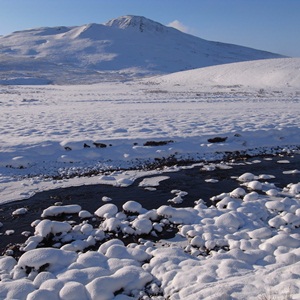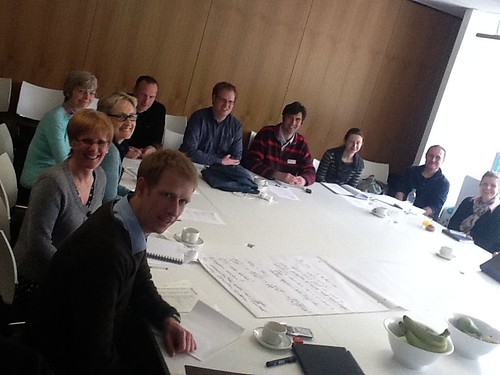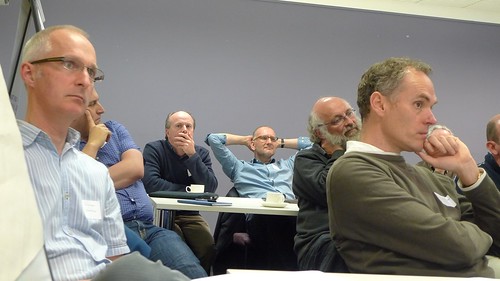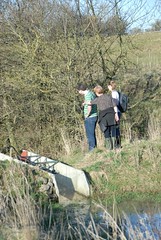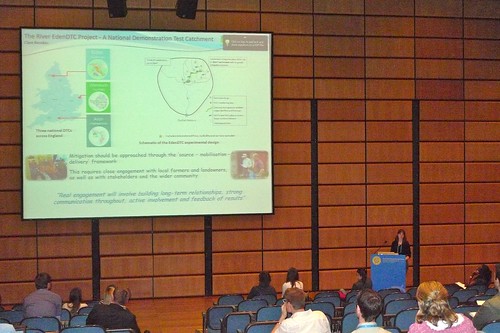Wednesday, 19 December 2012
Merry Christmas - and here is Calendar for 2013
Friday, 14 December 2012
Wednesday, 5 December 2012
Friday, 19 October 2012
Happy away day!
On Wednesday we all popped up to the Eden Valley to do some soils sampling and some general CSWM team bonding and soil sampling. here's a snap of some of the happy samplers!
Chris Turner on the Environmental Virtual Observatory
Untitled a video by Soil & Water Science on Flickr.
Thursday, 11 October 2012
Prize winners
Congratulations to Kirsty Ross and Micheal Knott pictured here either side of me, receiving their prizes from the British Society of Soil Science (BSSS) for the best undergraduate Soil Science Performances at the Environment Centre, Lancaster University. Thee photo was taken at the National Space Centre, at the dinner of the BSSS annual meeting. Thanks to Karl Ritz for taking and supplying the photo.
Wednesday, 27 June 2012
On the role of Art in Catchment Science
John Fox of Dead Good Guides talks at the Catchment Change Network Conference June 2012
Monday, 28 May 2012
North Wyke - a Piece of Cake!
Just back from a terrific launch of the North Wyke farm platform. The approach taken in Devon is to instrument the entire grassland farm in 3 contrasting long term experimental systems - the ultimate systems biology of the landscape. Really impressed with the way the have done this - akin to the approach adopted in the UK DTC projects and complimentary to the EVO pilot framework. Well done North Wyke - live long and prosper (and jolly good cake art too!). If you click on the picture you will get a link to more pictures taken on the day.
Wednesday, 16 May 2012
Cool new video on the River Eden
Monday, 14 May 2012
Exploring opportunities for knowledge exchange
Today I have been with colleagues from the Defra DTC programme at Lancaster University exploring opportunities for knowledge exchange for catchment science. We identified that the immediate need was to produce a policy guidance note for helping Defra communicate issues of diffuse pollution to wider stakeholders. A longer term opportunity, needing more funding, is to make a short film to help communicate the issues. More on that later......
Friday, 11 May 2012
A meeting of minds
I have just spent the day with colleagues from Lancaster University, Liverpool University, POL and CEH in a workshop thinking about new opportunities in water science. What was so exciting was that this particular grouping seemed to have the whole water cycle covered - from the soil pore through to the deep ocean (the only glaring 'hole' we identified was a lack of expertise on estuaries). I cannot remember a grouping of people that has ever had so much potential. We need to find a way to turn it into something.....
Tuesday, 1 May 2012
The polluter pays principle: But who is the polluter?
Friday, 27 April 2012
Catchments and stakeholders - its not all science in a test tube
My team and I are just back from an informative few days presenting and discussing at the European Geosciences Uniion meeting in Vienna. We mostly took part in a session that explored the challenges and solutions to catchment science problems, working across the boundaries of biophysical science and softer stakeholder interactions. It is my firm believe that the real solutions to diffuse pollution will ultimately be delivered through catchment stakeholders, but I was intrigued as to why so much of this high profile meeting (our session excepted) placed so much emphasis on finessing minute details of biophysical science or model building. Of course I too am a scientist, but it is increasingly obvious that my science will have little impact unless i work with those who know and manage the catchments. Step by step.....
Friday, 13 April 2012
Prof Phil Haygarth on Radio 4's Farming Today
Yesterday I was interviewed at rather short notice via an ISDN line at Lancaster University by Caz Graham at the Farming today team. The subject was farm pollution following the dry weather; it went reasonably well (you can go to the Radio 4 web and listen yourself http://www.bbc.co.uk/programmes/b01dghb3#synopsis) but I was a little perturbed by Caz's edit about 'the sea'. Most of the effects that I was referring to were actually associated with fresh and possibly estuarine waters, they are not commonly sea issues. Nonetheless, good to get the message out there...
